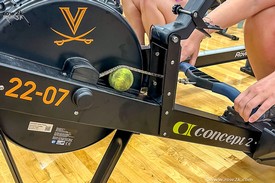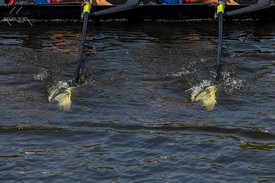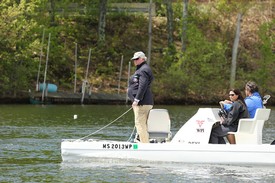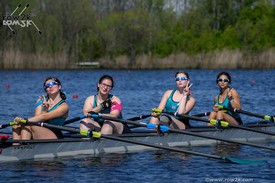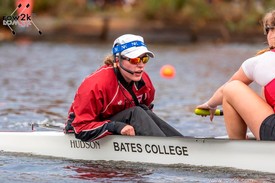Rowing Lessons, Simply Told
"Another Power 10," by Fred Borchelt
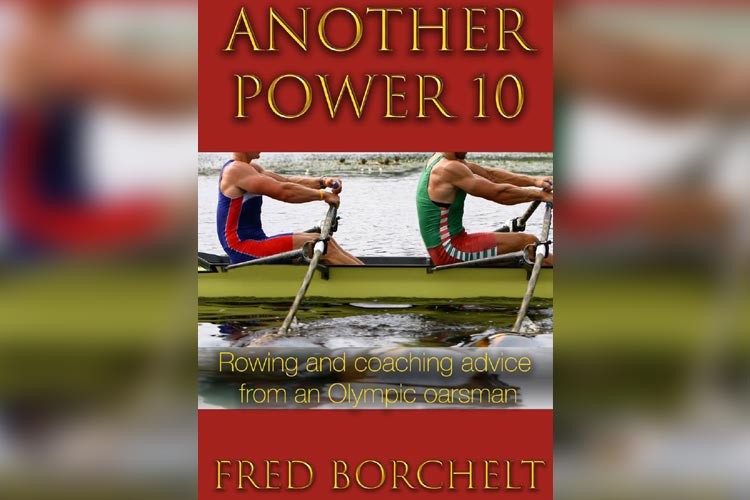
As recently as 2015, if you were a freshman male rower in just about any collegiate rowing program, you would have rowed on the freshman team. Your coach would have been tasked with integrating the recruited high school rowers with the walk-on athletes, teaching and refining your rowing technique to match what would be required by the Varsity coach later on in your career, and most importantly, helping you to balance the demands of a full-year endurance sport with the brand-new experience of rowing in college.
Fred Borchelt was the freshman coach for the Harvard heavyweights from 1987-1990, and many of the experiences and advice that Borchelt dispenses in his new eBook Another Power 10 (Amazon.com Kindle Store, $2.99) come out of his experience working with the Harvard freshman team as an assistant coach to Harvard's legendary Harry Parker.
Borchelt may be one of the most unsung, or at least under-sung personalities in American rowing; a three-time Olympian ('76, '80, and an Olympic silver-medalist in the M8+ in Los Angeles in 1984), Borchelt has spent considerable time as a coach, but also as a coaching mentor, appearing frequently at high school rowing events and conferences to share stories and advice.
His newest book is a companion volume to his first book, "Power 10," which appeared in 2014. Like that book, "Another Power 10" is divided into ten chapters, each with a kernel of knowledge or advice for rowers, coaches, or both.
The book is brief at 59 pages, but keeping in the spirit of a power 10, it's meant to be. (Indeed, as my own freshman coach once taught me, "you can't expect to win a race on a single power 10!"). Borchelt weaves the stories of his own rowing experience as a high school rower, collegiate athlete at Rutgers, on the Olympic team, and as a collegiate and high school coach together to provide straightforward advice, reminders if you will, of things that he considers important in rowing.
There are a few things this book is not; despite acknowledging the deep influence on his coaching and personal debt that Borchelt feels he owes to Harry Parker, this is not a "Parker book." (For a very readable recent example of an in-depth examination of Parker's coaching and personality, pick up Toby Ayer's "The Sphinx of the Charles" from 2017).
Borchelt opens his book with a chapter entitled "A Good Coach," and distills what he feels he learned from coaching with Parker, and while he pays tribute to Parker's technical expertise, he finds that the single biggest lesson he took away from his time at Harvard was in how to structure a practice or series of practices so that his athletes could "strive for a personal victory" each day, and emerge as stronger individuals, crews and a team as a result.
Borchelt relates the story of a particularly grueling erg workout he had his freshman do, one which they completed with great difficulty, and one that Borchelt had felt good about assigning. As his rowers leave the boathouse, "none of them said goodbye or even looked at me on their way out, [their] heads hung low, shoulders drooping, dejected and defeated," Parker offers Borchelt some advice.
This first chapter sets the tone for the remainder of the book. Mixing purely technical advice (Chapter 2: "It's all in the Hands"), training advice (Chapter 4: "The Power of the Pyramid") with chapters that rowers and coaches can use to re-examine their approach to their daily, weekly or seasonal workouts (Chapter 9, "Every Stroke Counts") and broad, perspective-building advice (Chapter 3, "Setbacks Can Make You Stronger," Chapter 6, "Mental Toughness," Chapter 11, "Nerves of Steel), both athletes and coaches will find more than a few kernels of wisdom and practical advice in the book.
Ever humble, Borchelt does not posit his experiences as "the one true way," nor does he hew to a specific school of rowing style or training protocols, and this book should not be taken as any kind of blueprint or roadmap.
Rather, Borchelt is keen on pointing out the commonalities in rowing, from the high school up through the elite level, that have served him well, and could conceivably do so for others. It's refreshing to see Borchelt spend time reflecting on the simple skill of listening (both for coaches and athletes), and the profound effect of engaging with your coach or athlete in a mindful way. (And to Borchelt's credit, it's telling that the initial draft of his chapter on "listening" was drafted 13 years ago, well in advance of the current movement towards "mindfulness.")
Borchelt's overall message, as he states in his conclusion (or, the "lengthen stroke" after the power 10, if you will), is this:
This focus on improvement is Borchelt's prime mover. "I have shared the things with you that I wish someone had shared with me early on in my competitive career," he writes, and it's not a false statement to say that even experienced rowers and coaches will find a few good reminders and wise insights in this book.
Whether you row, coach, or do both, Fred Borchelt's book will teach you something new, remind you of something important, or even simply excite you to get back out there and work on the sport we all love.

"A workout should be structured such that the athlete must push himself to extend his limits in order to satisfactorily complete it," [Parker said]. "With a stretch on his part he should be capable of coming out of it with a sense of victory and accomplishment. Even though your guys accomplished the goal you set for them today they were all crushed by the difficulty of the task. When they complete a demanding workout feeling like winners their motivation to stretch themselves the next time you challenge them increases. Make it possible for them to feel positive when they achieve their goal."
"The Olympic motto is "faster, higher, stronger" not "fastest, highest, strongest". Making a commitment to excellence means that you are striving to be a little bit better tomorrow by giving your best effort today. As I have pondered how the skinny kid in the driveway made it to the Olympic victory podium at the Los Angeles Games I have come to realize that it was because I was totally committed to getting better at the sport of rowing day after day, month after month, year after year."
If you enjoy and rely on row2k, we need your help to be able to keep doing all this. Though row2k sometimes looks like a big, outside-funded operation, it mainly runs on enthusiasm and grit. Help us keep it coming, thank you! Learn more.
Comments | Log in to comment |
There are no Comments yet
| |
- Bont Rowing
- Calm Waters Rowing
- Concept 2
- Craftsbury Sculling
- The Crew Classic
- CrewLAB
- Croker
- Dad Vail Regatta
- Durham Boat Co.
- Empacher
- Faster Masters
- Filippi
- Fluidesign
- h2row.net
- HUDSON
- Live2Row Studios
- Nielsen-Kellerman
- Oak Ridge RA
- Peinert Boat Works
- Pocock Racing Shells
- Race1 USA
- Rockland Rowing Masters Regatta
- RowKraft
- Rubini Jewelers
- Vespoli USA
- WinTech Racing
- Bont Rowing
- Calm Waters Rowing
- Concept 2
- Craftsbury Sculling
- The Crew Classic
- CrewLAB
- Croker
- Dad Vail Regatta
- Durham Boat Co.
- Empacher
- Faster Masters
- Filippi
- Fluidesign
- h2row.net
- HUDSON
- Live2Row Studios
- Nielsen-Kellerman
- Oak Ridge RA
- Peinert Boat Works
- Pocock Racing Shells
- Race1 USA
- Rockland Rowing Masters Regatta
- RowKraft
- Rubini Jewelers
- Vespoli USA
- WinTech Racing



